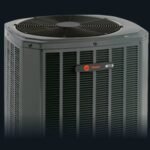An AC register is a crucial component of your HVAC system, serving as the endpoint where conditioned air enters your living spaces. Equipped with adjustable dampers, these registers allow you to control the direction and volume of airflow, contributing significantly to indoor comfort and energy efficiency.
Types of AC Registers
AC registers come in various designs to suit different installation needs:
- Floor Registers: Ideal for heating systems, as warm air naturally rises.
- Wall Registers: Common in both heating and cooling systems, offering versatile placement options.
- Ceiling Registers: Often used in cooling systems, as cool air tends to sink, promoting even distribution.
Each type is designed to optimize airflow based on its placement, ensuring efficient temperature regulation throughout your home.
Importance of Proper Placement and Sizing
The efficiency of your HVAC system heavily relies on the correct placement and sizing of AC registers:
- Placement: Registers should be strategically located to promote uniform air distribution and prevent hot or cold spots.
- Sizing: Registers must match the duct opening dimensions to maintain proper airflow and system balance.
Improper placement or sizing can lead to reduced comfort and increased energy consumption.
Installation and Maintenance Tips
Installation:
- Measure Accurately: Ensure the register size matches the duct opening for a snug fit.
- Secure Properly: Use appropriate fasteners to attach the register firmly, preventing air leaks.
Maintenance:
- Regular Cleaning: Dust and debris can accumulate on registers, hindering airflow. Clean them periodically to maintain efficiency.
- Inspect for Damage: Check for signs of wear or damage, replacing registers as needed to ensure optimal performance.
FAQ
1. What distinguishes an AC register from a grille?
An AC register includes adjustable dampers to control airflow direction and volume, whereas a grille is a fixed cover without dampers, typically used for return air vents.
2. How often should I clean my AC registers?
It’s advisable to clean registers every few months or more frequently if you notice dust buildup, to maintain good air quality and system efficiency.
3. Can I install AC registers myself?
Yes, with basic tools and accurate measurements, you can install AC registers. However, for complex systems, consulting a professional is recommended.
4. Do decorative registers affect airflow?
While decorative registers add aesthetic appeal, ensure they are designed to allow adequate airflow to prevent compromising HVAC efficiency.
5. Is it beneficial to close registers in unused rooms?
Closing registers can disrupt the balance of your HVAC system, potentially leading to pressure issues. It’s generally better to keep them open and adjust the thermostat for energy savings.
Understanding the function and proper maintenance of your AC register is essential for ensuring your HVAC system operates efficiently, providing consistent comfort throughout your home.










